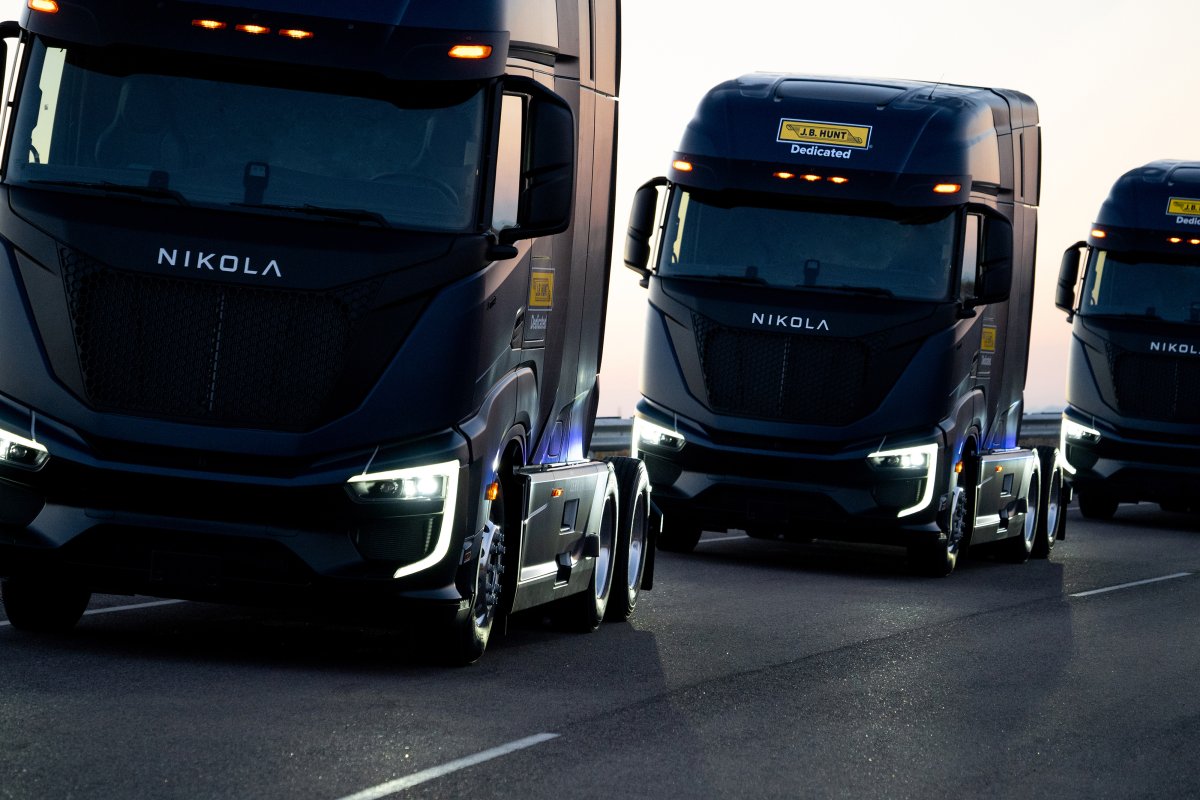The U.S. Environmental Protection Agency on Friday announced the strictest rules yet on greenhouse gas emissions from heavy trucks, completing a suite of ambitious rules intended to cut emissions from the country's transportation sector, its biggest source of climate pollution.
"This is another giant step forward to protect future generations from climate change," EPA Administrator Michael Regan said in a press briefing on the final standards.
The rules will apply to eight classes of heavy trucks, from delivery vehicles and garbage trucks to long-haul rigs, and will cover model years 2027 through 2032.

The EPA does not dictate a particular technology with the rules, leaving it to truck makers to decide how to meet the performance standards. An earlier EPA analysis estimated that the rule could result in truck makers using zero-emission battery electric or hydrogen fuel cell vehicles for anywhere from 10 percent to 40 percent of their fleet, depending on the class of vehicle and the company's emissions reduction strategy.
"Looking across multiple classes of vehicles, the industry can make proper investment strategies, giving them flexibility to choose from a range of options," Regan said.
Transportation accounts for 27 percent of the country's total greenhouse gas emissions, the agency said, and within the transportation sector, heavy-duty vehicles are the second-largest contributor, making up about a quarter of transportation emissions.
The EPA estimated that the standards will avoid 1 billion tons of greenhouse gas emissions and provide $13 billion in net benefits by reducing climate risk and enhancing public health.
The announcement comes just a little more than a week after the Biden administration set strict rules for cars and light trucks, and earlier rules addressed truck pollutants causing smog and soot.
The Biden administration also paved the way for the new truck standards with the launch earlier this month of a national strategy for a zero-emissions freight corridor. That initiative aims to build the electric charging infrastructure along the routes most heavily used by heavy trucks.
According to the EPA, 75 percent of heavy truck traffic occurs on just 4 percent of the nation's roads. Focusing first on that corridor could ease the transition to zero-emission vehicles, the agency said, and improve air quality for the communities along those highways currently bearing the brunt of pollution impacts.
The EPA's new rules won praise from the American Lung Association and the Hip Hop Caucus, a nonprofit that encourages young people to engage in social issues. Hip Hop Caucus President Rev. Lennox Yearwood Jr. said during the EPA briefing that heavy truck pollution disproportionately affects low-income communities and communities of color.
"Our communities have for years been concerned about the health impacts from the thousands upon thousands of trucks that travel our communities daily," Yearwood said.
With last week's announcement on tailpipe emissions standards for cars and light trucks, the EPA touted a compromise struck with industry and union workers. That agreement allowed automakers more time to shift to electric vehicle manufacturing and won support from the industry's major players.
The EPA said the final rule on heavy trucks likewise includes more time in the early model years of the program to develop new technology. Industry response to the truck rule, however, is markedly sharper.
American Trucking Associations President and CEO Chris Spear called the EPA's targets "entirely unachievable" and said he opposed the new rules.
"Any regulation that fails to account for the operational realities of trucking will set the industry and America's supply chain up for failure," he said. However, Spear added, the industry is committed to achieving zero emissions.
In an email to Newsweek, Derek Leathers, chairman and CEO of the shipping and logistics company Werner Enterprises, said his company is committed to reducing emissions but had concerns about "infrastructure challenges and uncertainties surrounding the long-term viability of electric vehicles." Leathers said it will be critical for regulators and industry stakeholders to work together.
Some truck manufacturers, however, have been shifting into zero-emission gear recently and support the EPA's move. Mack Trucks rolled out new medium-duty electric vehicles at a major truck show last March, and Mack's parent company, Volvo Group, said in a statement that it is "completely aligned with EPA's objective of speeding the transition to zero-emission vehicles (ZEVs)."
Volvo Group North America's Senior Vice President for Public Affairs Jonathan Miller told Newsweek in an email that the EPA's final rule is more realistic than the original proposal. But Miller cautioned that unlike previous emissions standards, meeting this one will depend on factors beyond the company's control.
"Customers won't buy ZEVs unless they're confident they have access to charging," he said.
Last month, Volvo Trucks joined Daimler Trucks and Navistar to launch a new partnership to speed up the development of charging stations and other infrastructure needed for cleaner trucks.
Other manufacturing companies are also offering large trucks with electric and hydrogen fuel cell power.
J.B. Hunt Transport Services, one of the country's largest truck fleets, began adding zero-emission vehicles to its fleet last year and purchased 13 electric and hydrogen fuel cell vehicles from Arizona-based truck maker Nikola Corporation.
Daimler Truck appears on Newsweek's 2023 ranking of the World's Most Trustworthy Companies, and J.B. Hunt is on Newsweek's 2024 ranking of America's Most Responsible Companies.
Despite the criticism from some of the trucking industry, the EPA's Regan said he was confident that manufacturers will be able to achieve the targets because the rule allows them to choose from a range of technologies.
"That will provide flexibility, offering a path that works for them and their consumers while remaining in pursuit of these very stringent environmental goals," Regan said.
Updated March 29, 2024, 10:40 a.m. ET: This story was updated to include additional comments from truck manufacturing companies.
About the writer
To read how Newsweek uses AI as a newsroom tool, Click here.





